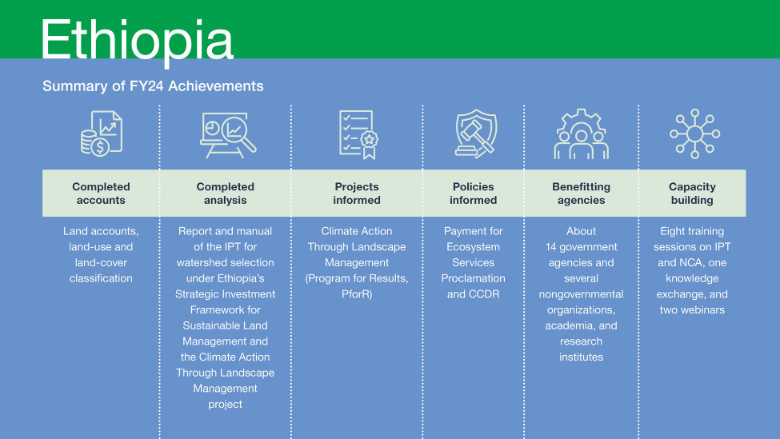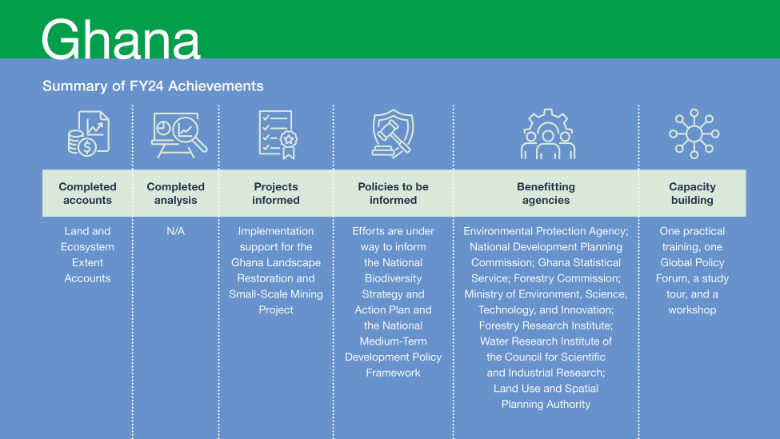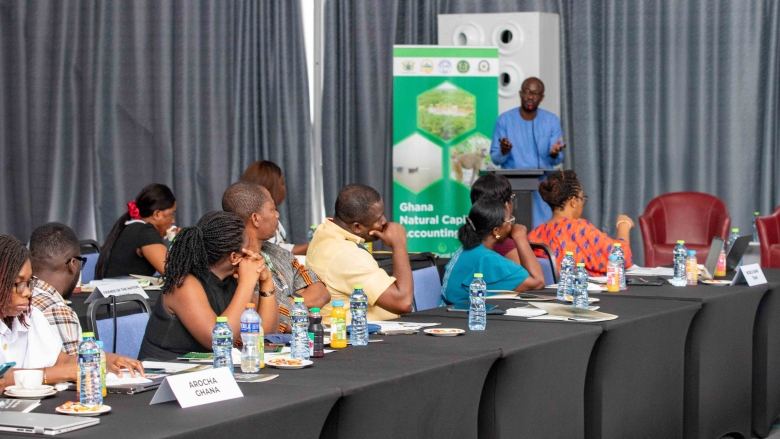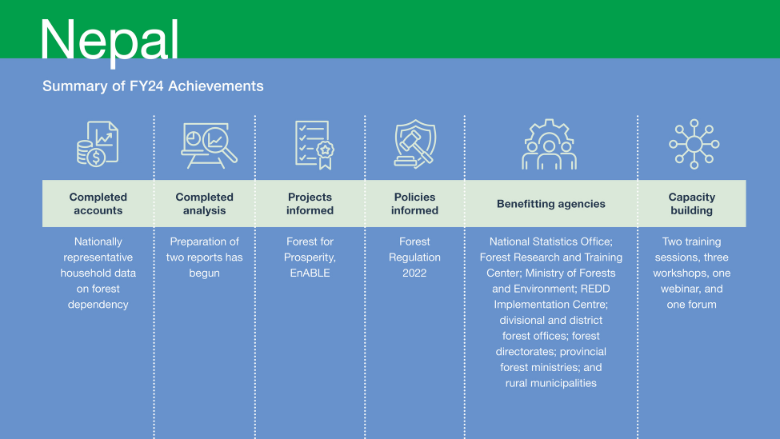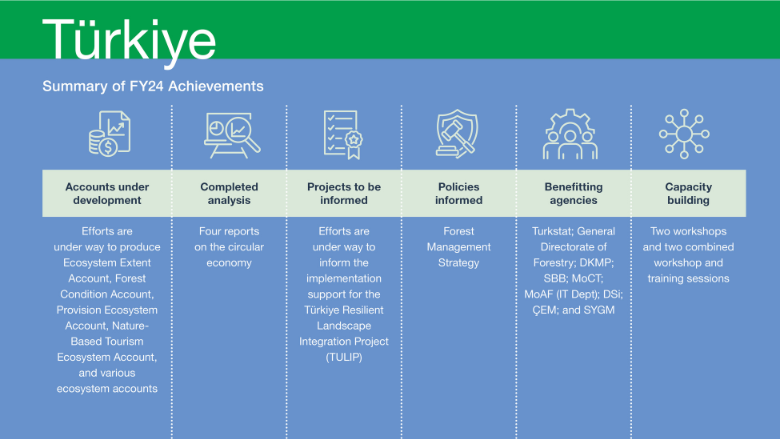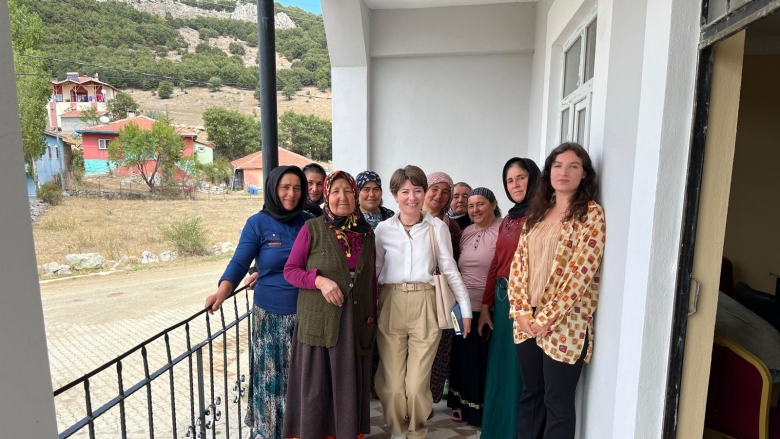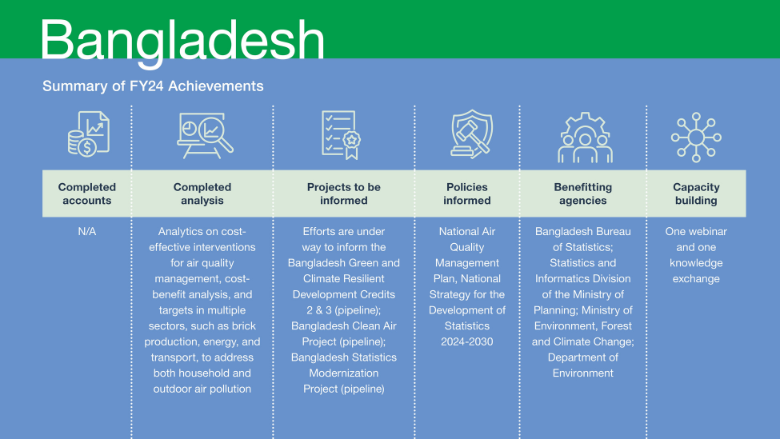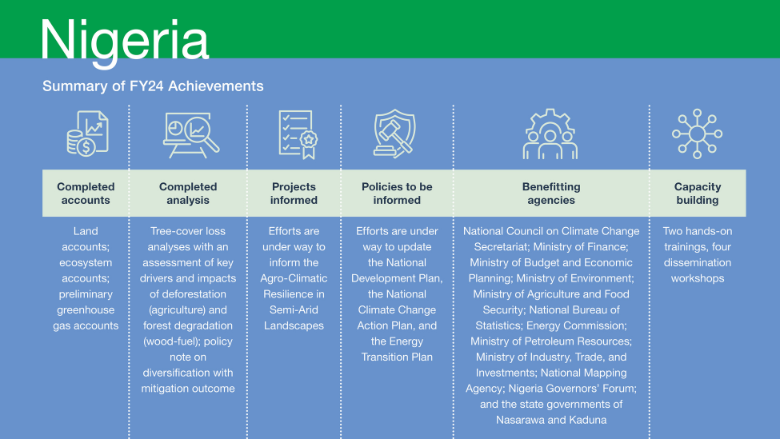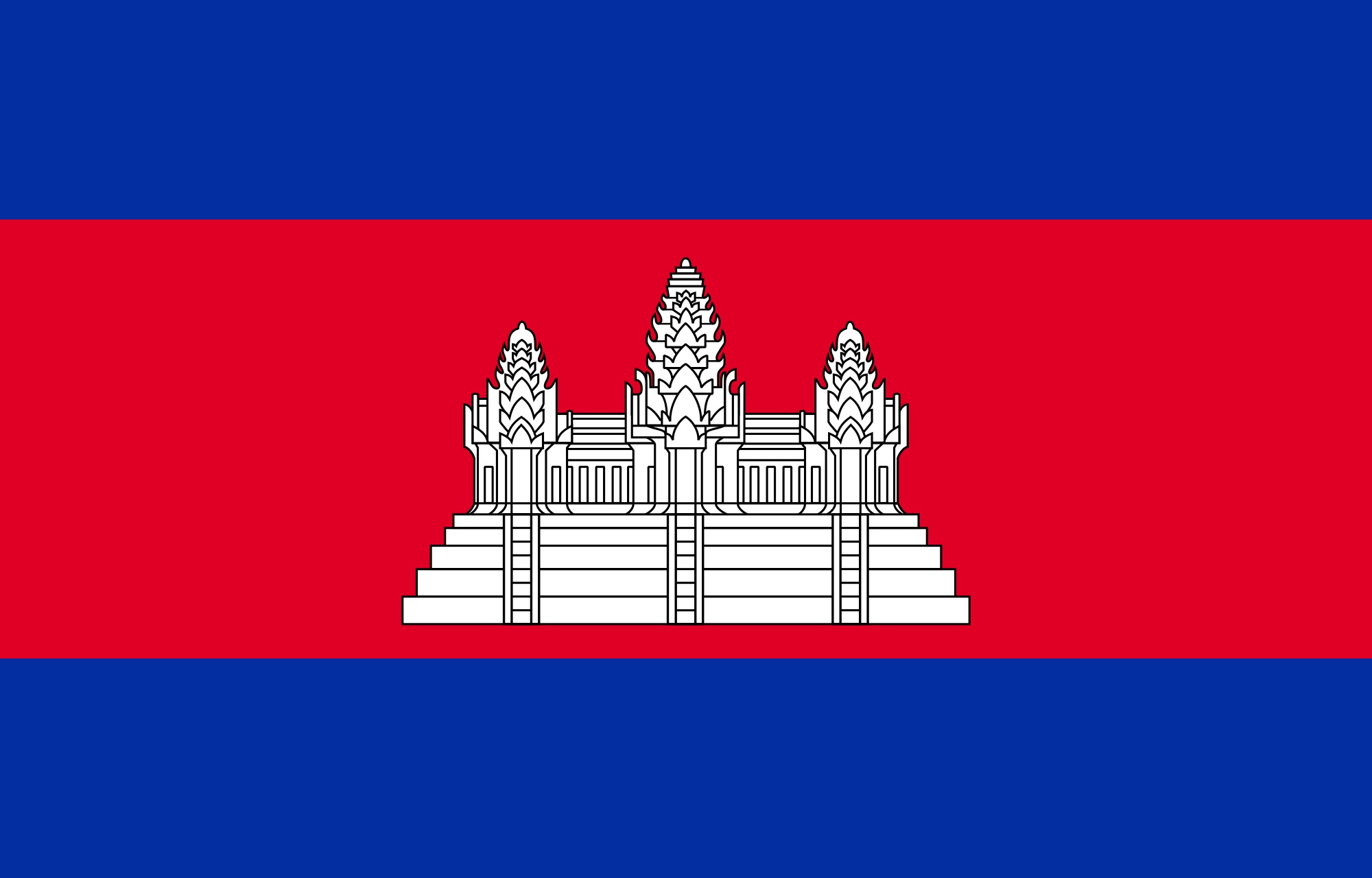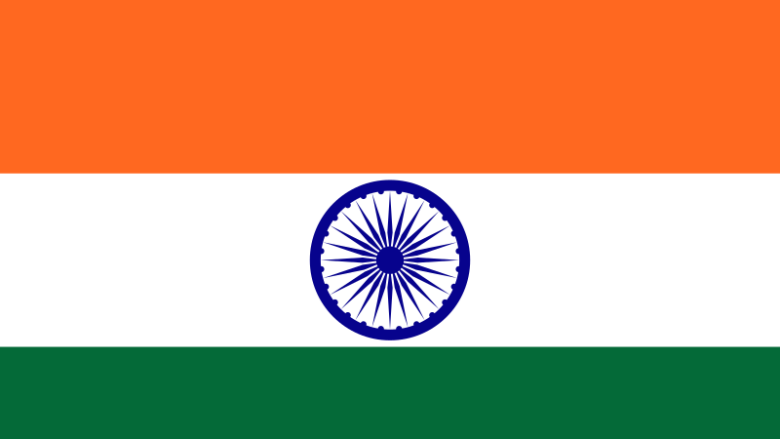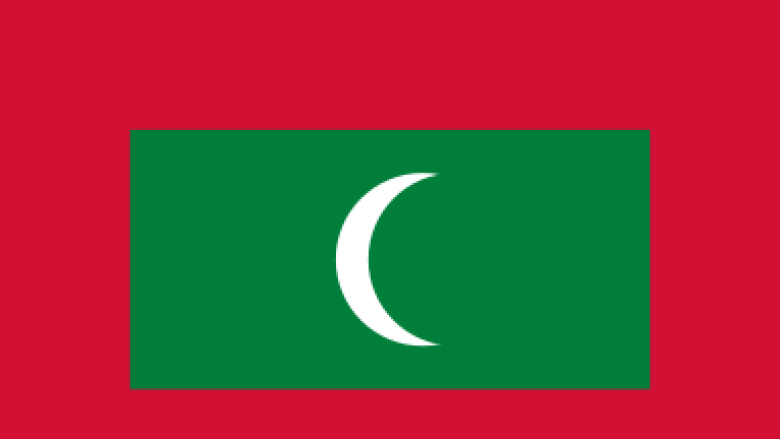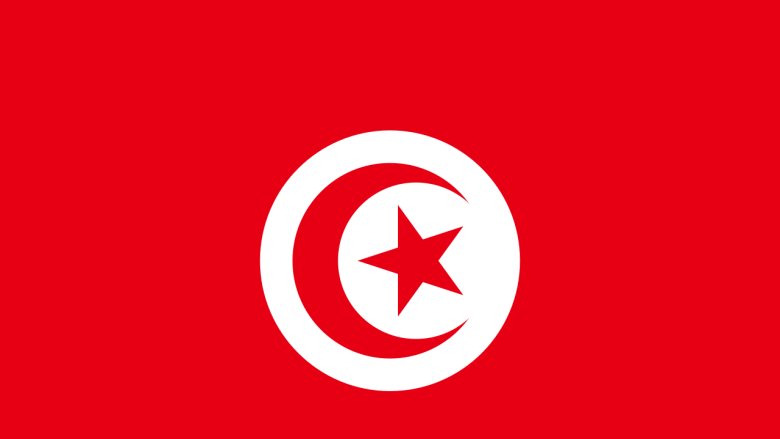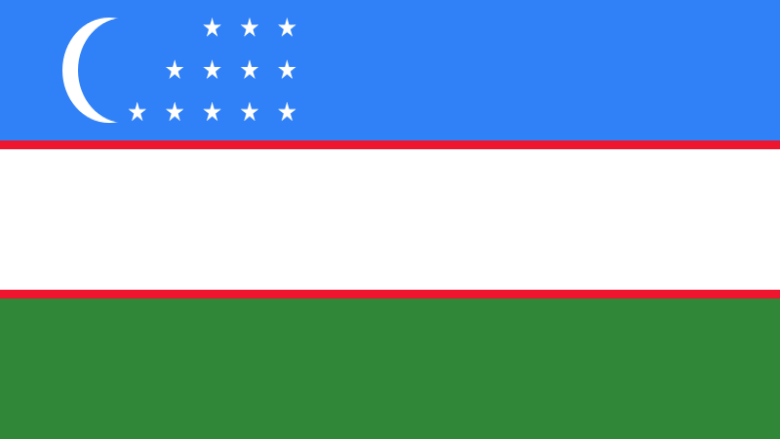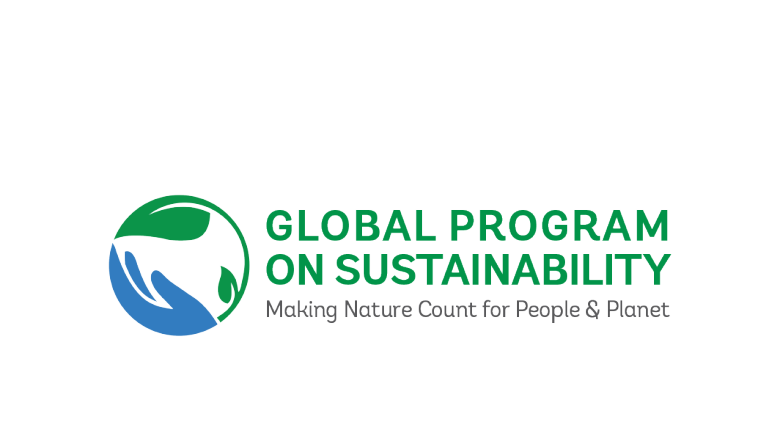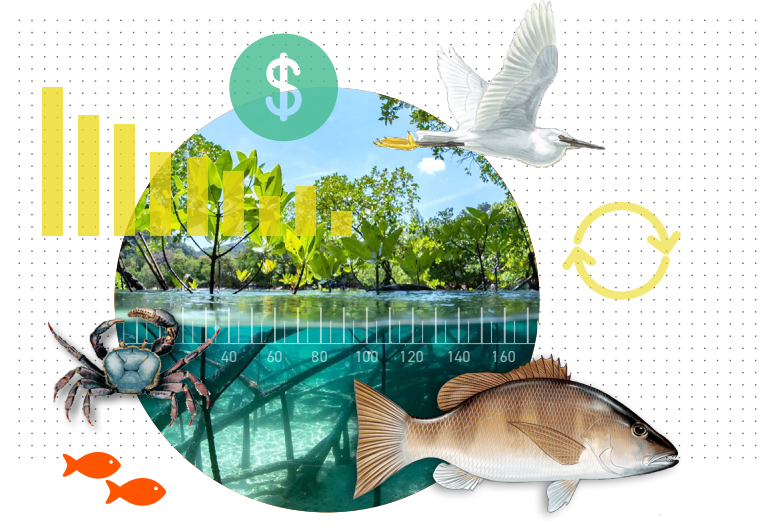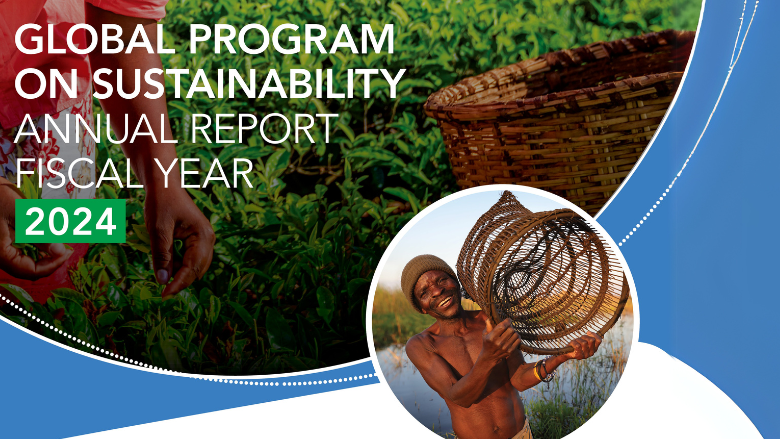Core Implementing Country
Development of Natural Capital Accounts, Data, Tools, and Analyses
The development of natural capital accounts has made significant progress this fiscal year, with the completion of the Land and Ecosystem Extent Accounts. The reference data and methodology used in developing the wealth and adjusted macroeconomic indicators were published. These datasets are publicly accessible and can be found on the Ghana Environmental Protection Agency website. The Land and Ecosystem Extent Accounts are being produced, including the compilation of underlying maps, data sets, and change matrices. These accounts will be peer reviewed by the United Nations Statistics Division and will be finalized and published by December 2024.
Considerable progress has been made in producing the Ecosystem Services Accounts. The data compilation is complete for provisioning ecosystem services, such as wood-fuel, timber, and non-timber forest products, as well as regulating ecosystem services like carbon retention and climate regulation. However, data is still being compiled on population, poverty incidence, household expenditure, and water-related ecosystem services. This information is crucial for developing a robust ecosystem services account.
Informing Investments and/or Policies
The Ghana CIC program provided support to the Ghana Landscape Restoration and Small-Scale Mining Project in producing a relevant set of land and ecosystem extent maps and change matrices for one district in December 2023. This successful work is now being replicated in 11 pilot project districts, with the CIC program team offering quality assurance support to inform efforts by the project in piloting the creation of spatial development frameworks at the district level. The assistance provided by the CIC program has been acknowledged in the project’s implementation support mission.
Progress has also been made towards informing two significant policy documents. The National Biodiversity Strategy and Action Plan will outline Ghana’s strategy for addressing biodiversity threats and ensuring the conservation and sustainable use of its biodiversity. The National Medium-Term Development Policy Framework sets out Ghana’s medium-term goals, objectives, and targets, serving as the foundation for the preparation and implementation of development plans by ministries, departments, and agencies. In FY24, a mapping exercise was initiated to determine how the land, ecosystem extent, and ecosystem services accounts can be used to establish national targets under the Global Biodiversity Framework. Although there is ongoing dialogue, the National Biodiversity Strategy and Action Plan process is now supported by the United Nations Development Programme and the World Bank is encouraging the use of NCA data to inform the process. To inform the National Medium-Term Development Policy Framework, a roadmap is being prepared to integrate biodiversity and NCA into national and regional development planning processes. A draft concept note outlining this plan has been prepared and shared with the World Bank. Furthermore, an explanatory note is being prepared to guide ministries, departments, and agencies on how to incorporate key findings from the grant activities into their respective medium-term development plans. This note will help ensure that the valuable insights gained from the CIC program are effectively integrated into the planning processes of various ministries, departments, and agencies.
Capacity Building and Institutionalization
Efforts are being made to institutionalize NCA and promote awareness and understanding of the concept. As part of these efforts, a practical training session on the production of accounts was organized in September 2023. This training spanned five days and had 29 participants, including five women, with eight government agencies represented. While GPS actively encourages the participation of women in such training, final selection by government agencies is often based on seniority or prior engagement in a given area and few women get selected. In March 2024, nine participants including five women from five key partner agencies participated in the Global Policy Forum on NCA in Rwanda. To further strengthen the government’s capacity to institutionalize NCA in relevant government policies and investments, a study tour was organized. This tour aimed to facilitate the exchange of ideas and experiences related to NCA for decision-making and policy making.
To strengthen information flow and coordination, the team continues to engage with other development partners like the Food and Agriculture Organization, the government of Denmark (Statistics Denmark), and the United Nations Environment Programme World Conservation Monitoring Centre, which are supporting different aspects of Ghana’s NCA program. The team also met with the United Kingdom’s Office of National Statistics to discuss available data and identify potential synergies with the World Bank/GPS-funded accounts.
Communication
As noted, representatives from government agencies participated in the Global Policy Forum on NCA in Rwanda. During the forum, the officials had the opportunity to share the outcomes and experiences from the Ghana CIC program. This was done through panel discussions, poster presentations, displays, and involvement in the CIC workshop, among other means.
Ghana’s Natural Capital Accounting program trains local journalists and Civil Society Organizations
Ghana’ s Natural Capital Accounting (NCA) program is currently developing and finalizing its land and ecosystem extent, as well as ecosystem services accounts, and discussing the application of these accounts in policy and investment decisions. The accounts are expected to be published by early 2025.
As part of the capacity building engagements under the program over 50 journalists and civil society organization (CSOs) representatives were trained at a one-day capacity-building workshop on NCA in Accra on 6th of August, 2024. The overall objective of the engagement was to equip the media and civil society with the knowledge and skills necessary to understand, interpret, and effectively communicate as well as advocate for NCA.
In her welcome remarks, Dr Ofosu-Baadu, Chief Statistician at the Ghana Statistical Service (GSS) and National Co-Coordinator, Ghana NCA Program, said the challenges posed by global climate crisis, biodiversity loss and other environmental excesses made the adoption of NCA crucial. “When NCA is mainstreamed into the country's economic accounting system, it would help to accurately measure the assets and liabilities of the nation’s natural resources for sustainable development”, she said. She therefore appealed to stakeholders, particularly the media and CSOs to work with state institutions in championing the NCA process, to help influence decision-makers and mainstream it into development policies.
In separate statements, the Director of Development Coordination at the National Development Planning Commission (NDPC), Dr Winfred F. A Nelson; the Deputy Executive Director of the Environmental Protection Agency (EPA), Abu Abdul Hanan, and the Director of Economic Statistics at the GSS, Edward Asuo Afram, representing the three NCA coordinating institutions, highlighted the need for the media and civil society organizations (CSOs) to work closely with the state institutions to preserve the country's natural resources for future generations.
Mr. Hanan said “we consider the media and CSOs to be our strategic partners in this NCA journey and the broader environmental protection mandate. The media, for instance, have a crucial role in setting the agenda and communicating the importance of Natural Capital Accounting to all relevant stakeholders.” Mr Afram believes that forests, wildlife, biodiversity and minerals are critical resources that needed to be adequately measured and accounted for whilst Dr. Nelson called for an urgent need for sustainable development, stating that evidence-based advocacy is essential to influence decision-makers.
The workshop also had some technical presentations on the overview of NCA program in Ghana, on the policy relevance of NCA in sustainable development, and on NCA for media and advocacy. The apex of the training was a panel discussion on Leveraging Natural Capital Accounting for Sustainable Development in Ghana: Challenges, Opportunities, and Effective Communication Strategies. This in-depth discussion focused on the current state of NCA in Ghana, the challenges and opportunities in implementing NCA for sustainable development in Ghana, practical strategies for communicating NCA concepts and findings to various stakeholders and potential collaborations between government, media, and CSOs in promoting and implementing NCA.
Learn more about GPS's work in Ghana
